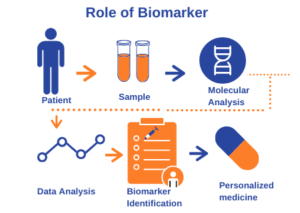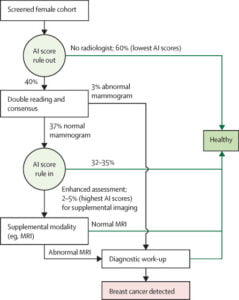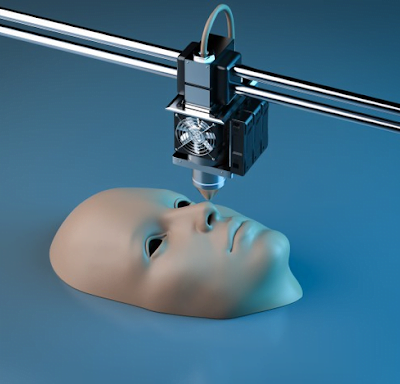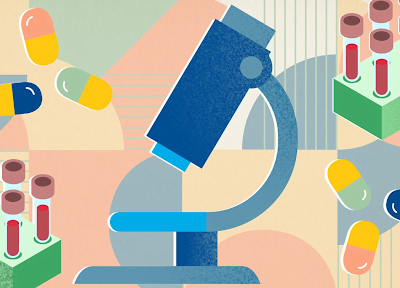Healthcare is a term that is used to define the efforts made by trained and authorized professionals in order to maintain or reinstate physical, mental or emotional well-being of a person. These days, healthcare refers to all aspects, services and devices that take care of your health. When you are a care provider for sick people who are in great need of your assistance, you can find yourself in incredibly challenging situations. After all, their life depends on how you react to the situation. There are times when you might feel completely exhausted and overwhelmed with never ending responsibilities. It’s so common for people in this field to work for long tedious hours, so to save you from tedious tasks Artificial Intelligence has taken a step forward. AI is capable of managing everything on its own from patient care to advanced research. The productivity and efficiency of healthcare services increased many folds with the advent of Artificial Intelligence, where technology can work for hours without ever getting tired.
AI in healthcare is a generic term that describes how Machine Learning (ML) and cognitive technologies are applied in the medical field. In the most basic sense, artificial intelligence is when machines mimic human cognitive behaviour, and are able to learn, think, and make decisions on their own. The increase in complex healthcare data means that artificial intelligence (AI) will be more and more applied in this field. Many types of AI technologies are already being used by care providers, hospitals, and life sciences firms. The key areas benefiting include diagnosis, treatment recommendations, patient compliance, and other administrative activities.
What is artificial intelligence?
Artificial intelligence (AI) is the intelligence of machines rather than the intelligence of human beings.

Intelligent devices can understand their surroundings and take appropriate action accordingly to achieve their objectives. Machines analyse the situation like human minds and work on problem solving. This is known as Machine Learning (ML).
Difference between AI, ML and DL
Artificial Intelligence- It is the engineering of making intelligent machines and programs.
Machine Learning- It is the ability to learn without being explicitly programmed. It is a machine’s capability to make human-like decisions.
Deep Learning- It is the learning based on Deep neural networks.

AI in Healthcare
Apart from bringing transformation in the field of healthcare, AI can prove advantageous to healthcare firms, mankind and medical industries in many aspects.
Some advantages of AI in healthcare are mentioned below-
- Effective and efficient decision-making
- Crucial predictions
- Expanding accessibility
- Cost-effectiveness
- Allows parsing through the huge data
- Carry out the data analysis tasks
- Progress at a faster pace
Applications of Artificial Intelligence in Healthcare
AI is capable of managing everything on its own from patient care to advanced research. The productivity and efficiency of healthcare services increase many folds with the use of Artificial Intelligence. Technology can work for hours without ever getting tired. Digital approaches in the healthcare industry are gaining more credibility with time due to advancement in technology. Furthermore, the pandemic has escalated the use of AI in healthcare. Existence of AI made it possible for us to get through this pandemic. The applications of AI in healthcare cover a wide range of fields, including drug discovery, disease diagnosis, advanced research, gene editing etc. Some of the applications of artificial intelligence are discussed below.

- Medical Biotechnology
- Gene Editing
- Personalised Medicine
- Genome Annotation
- Breast Cancer Detection
- Lab Assistance
- AI in controlling Covid-19 Pandemic
- AI for living assistance
1.Medical Biotechnology
Medical biotechnology includes the use of living cells to benefit humans by producing drugs and antibiotics. It is done by manipulating the genome of specific cells for the production of desirable compounds.
Artificial Intelligence and Machine learning are extensively used in drug discovery.

Applications of AI in drug discovery and development-
- Aggregating and synthesising information
- Understanding disease mechanisms
- Generating novel drug candidates

Machine learning is used in disease diagnosis. It uses true results for the accurate diagnosis. Both AI and ML are being widely used in gene editing, radiology, personalised medicine, medication management, etc.

2.Gene Editing
AI based assistance providers have made the complex task like gene editing simpler. Desktop Genetics has created a platform to design gene editing constructs using CRISPR that works through AI. Their gene editing platform runs the entire process from RNA selection to data analysis.
3.Personalised Medicines
Because of personalised medicine doctors are able to provide more specific treatment plans to the patient. AI can deliver faster and accurate results than a clinical expert, due to deep learning algorithms used in deciphering and analysing large data sets. AI can spot available trends, match them to diagnostic outcomes, and apply these trends in developing personalised medicine.
4.Genome annotation
- Can we find out the function of a part of the genome?
- If a gene is linked with disease or not?
- Can a disease be cured by manipulating the genome?
To answer the questions mentioned above we need to have detailed mapping of the genome. With the help of AI we can create databases and store a large number of sequenced and mapped genomes to help in further studies.

5. Breast cancer detection
Several artificial intelligence (AI) cancer-detection software algorithms have been developed for mammography. Some software algorithms are now comparable to the performance level of radiologists in assessing mammograms (Dembrower et. al., 2020).
6. Lab Assistance
Tedious tasks done in the lab such as designing constructs for gene editing or data analysis are slowly being handed over to AI programs. For scientists who want quicker and/or easier data analysis, there are startups focused on using AI to look at many types of data, eg., H2O.ai.
7. AI in controlling Covid-19 coronavirus
Artificial intelligence is being used as a tool to support the fight against the viral pandemic that has affected the entire world since the beginning of 2020. The predictions of the virus structure generated by AI have already saved scientists months of experimentation.

The American start-up Moderna has distinguished itself by its mastery of a biotechnology based messenger ribonucleic acid (mRNA) for which the study of protein folding is essential. It has managed to significantly reduce the time required to develop a prototype vaccine testable on humans, all thanks to the support of bioinformatics, of which AI forms an integral part.
Insilico Medicine recently announced that their AI algorithms designed six new molecules that could limit COVID-19 pneumonia’s ability to virally replicate in cells. These molecules are significantly different from known drugs but the reshuffled known drug motifs are predicted to be effective 3C-like protease inhibitors.
Infervision’s AI software looks at lung CT scans to quickly detect lesions, and measure their volume, shape, and density to help doctors refer potential positive patients for diagnosis of the disease. The software also learns, with more scans helping the algorithm improve accuracy.
Aarogya Setu uses contact tracing to record details of all the people you may have come in contact with, as you go about your normal activities. If any one of them, at a later point in time, tests positive for COVID 19, you are immediately informed and proactive medical intervention is arranged for you
8. AI for living assistance
In the area of assisted living for elderly and disabled people, AI applications using corresponding smart robotic systems are paving the way for improvements in life quality.
NNs can be trained with specific image-processing steps to recognize human facial expressions as commands. Furthermore, human–machine interfaces (HMIs) based on facial expression analysis allow people with disabilities to control wheelchairs and robot assistance vehicles without a joystick or sensors attached to the body (Rabhi et. al., 2018)

People who are blind can make use of multiple functions of this intelligent assistant through a single user interface (Tumpa et. al., 2017).


Pros and cons of Artificial Intelligence
| Pros | Cons |
| Does not get tired easily | High cost maintenance |
| Rational and accurate decision maker | Creates unemployment |
| Applications in medical field | Is not creative |
| Selfless behavior | No improvement on its own with time |
Are you in favor or against artificial intelligence in healthcare? Let us know in the comment section below.







